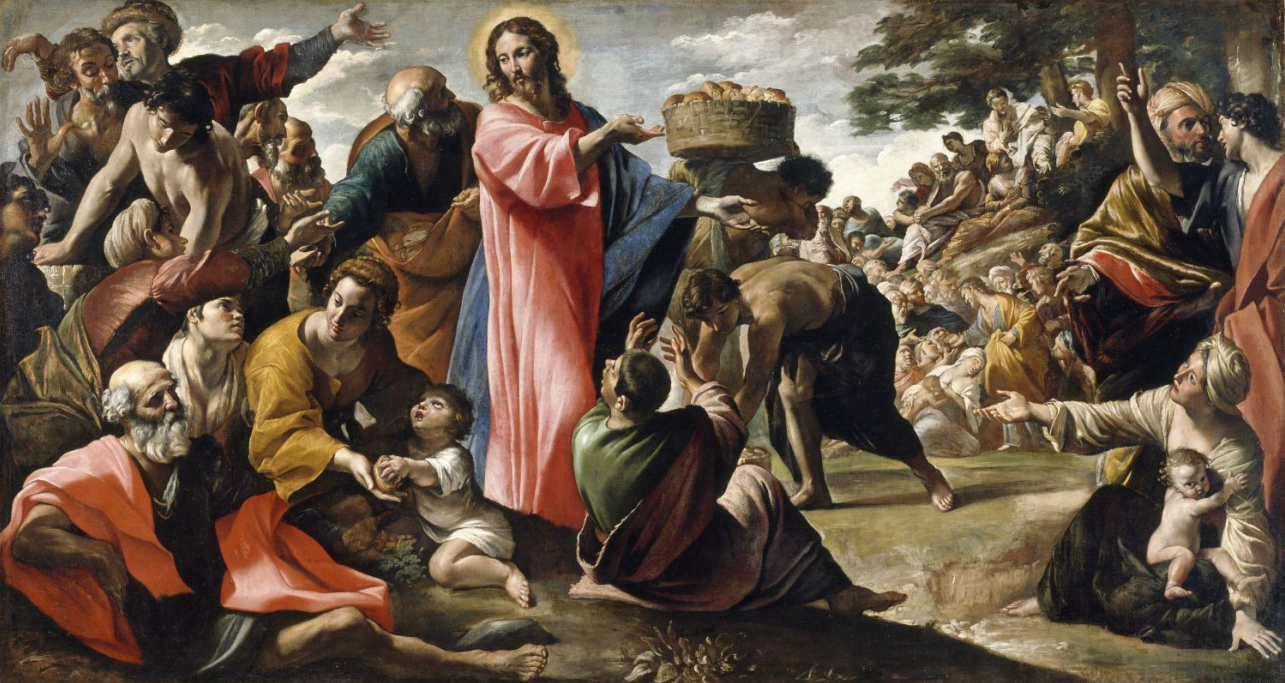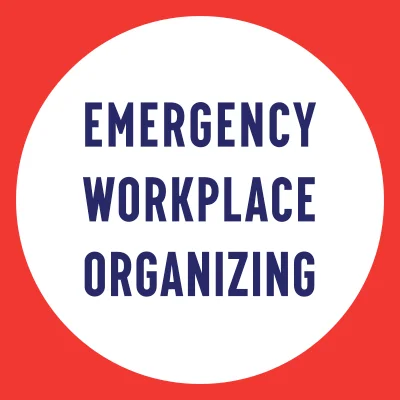

Resources for resisting ICE in your workplace
Whether or not you're in a union, you can build a strong defense against ICE in your workplace. Here's how.
The post Resources for resisting ICE in your workplace appeared first on EWOC.
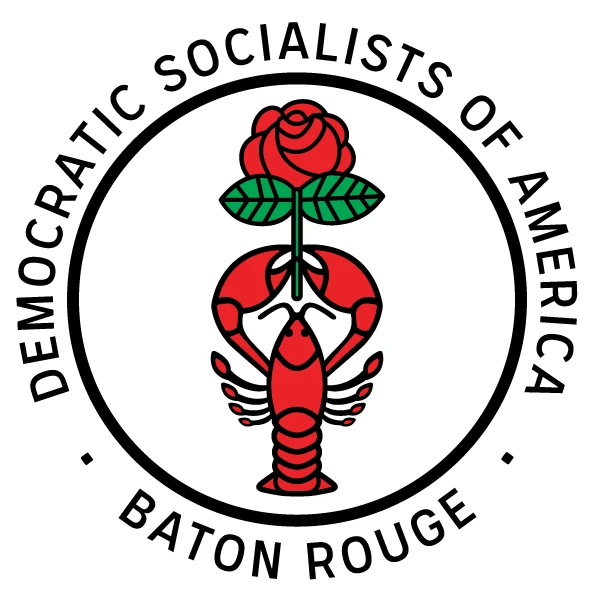

You cease, I fire


How to prepare for a general strike
Recent protests against ICE in Minnesota have led to a renewed interest in general strikes, but they take a higher level of organizing to pull off.
The post How to prepare for a general strike appeared first on EWOC.
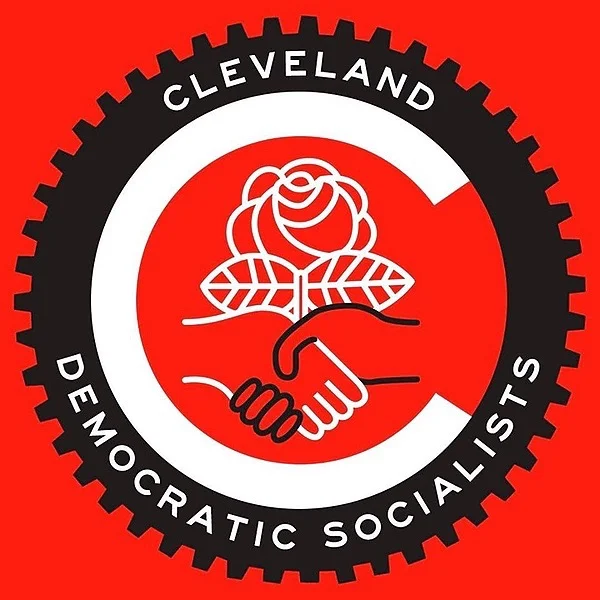

Winter Storm: Rapid Response in Minneapolis
Author: Russell K.
Like most of you, I have seen the daily horrors in Minneapolis from the deceptively secure distance of my phone and my television. I have seen, a dozen times, the murder of an innocent woman by masked criminals with badges. I have seen through these screens how she was smeared, how the Trump administration reacted, and how the situation escalated in Minneapolis.
ICE has created a deliberate environment of fear and intimidation. There is no other reason for them to be patrolling schools and grocery stores and even churches. It is true that they have brought terror upon the people of Minneapolis, but the people have shown great courage in resisting these masked criminals. The motivated people of Minnesota have put their lives and careers in jeopardy to protect the least among them and their example should inspire us all. Particularly relevant to us is the rumor that ICE will soon be surging to Springfield, Ohio. Should this be true, their example poses a challenge to us – do we have the strength and courage to resist as they have? Or will we prioritize our own safety and comfort over the lives of our neighbors?
Video upon video exists of heavily armed masked men prowling the streets, breaking into homes and cars, and splitting up families. But I saw, too, how the people of Minneapolis resisted. How they refused to stand idly by and watch their neighbors become victims. Finally, I was told that while what I was seeing online from ICE was bad, it was worse on the ground. Eventually I decided to see if that was true, to go and see how the ground looked for myself.



The people of the Twin Cities and Minnesota are enduring a great ordeal. They are tired, but they remain determined to resist. They are scared, but despite all they have endured, their hope remains undiminished. ICE themselves have made no secret of what they are doing – they are deliberately terrorizing the people of Minnesota. According to a DSA member I grew acquainted with: “Everyone here has been tear-gassed or knows someone who has.” She herself was tear-gassed by state police when people protested the shooting of a Venezuelan man by ICE in the north of the city.
Efforts have been made to document as much of ICE’s violence as possible. Photos and videos were encouraged and forwarded to the ACLU in the hopes of eventual prosecution. The following is my own small piece of documentation, a recollection of the time I spent in Minneapolis.
Tuesday (1/20):
I arrived on Monday night, but Tuesday was my first full day in Minneapolis. Having signed up to Twin Cities DSA’s (TCDSA)’s daily ICE bulletin, I read about a church, Dios Habla Hoy (DHH), that was giving out food to families sheltering in place, so I started the day there.
I arrived and joined in lifting boxes. The center of the church had been turned into a ring of tables, where one person would bring a box into the circle for another to stock it from outside. The box would reach the end and be handed off to a human chain of people. The box would then make its journey down the steps and be loaded into a truck, where it would be brought to the loading station outside for drivers. There could be as many as three human chains at any given time, bringing food deliveries inside and prepped food outside.
Speaking with TZ, a knowledgeable volunteer who was handling driver registrations, I learned about the church. They had only started distributing in December with just 20 families. By the time I spoke with them, they were making 800 to 1,000 deliveries each day. They sourced food from donations, food banks, and recyclers. Nearly every building in Minneapolis I entered had tables piled with supplies. They often had too many volunteers, to the point where the general chaos could slow them down, but they were grateful for the efforts of people and were holding trainings constantly.
After lifting many boxes and planning to return for driver training (it was technically full, but TZ, understanding my limited time, snagged me a seat), I volunteered to stand watch outside. My hour and a half watch was mostly uneventful, but the church was being watched. At some point, three large vehicles with New Mexico plates showed up in short succession at the restaurant across from the church. We suspected ICE. Two patrollers came, sat near them at the restaurant, and all but confirmed them to be so. This had become quite normal for the church over the past weeks. After leaving DHH this evening, I would encounter my first, but not last, still running vehicle on the side of the road from which ICE had abducted the driver.
Later that evening, I arrived outside the TCDSA chapter’s office. I did not have a personal contact, but the calendar said that a meeting was taking place inside. Given the cars and the lit windows, I assumed this to be true. I rang a buzzer, but I was not let in. I occupied myself outside, reading. Eventually a comrade left the building, and I greeted them at the door. We spoke for a few minutes, I showed him my membership card, and I was brought into the office where a number of comrades were chatting. They have a lovely office, I must say, but they did not want it photographed.
I spoke with a few of them before a person by the name of J came in. J is the TCDSA’s membership coordinator and began to explain and answer questions on what activities chapter members were doing and what TCDSA as a whole had been up to. Early on, TCDSA had realized that they probably wouldn’t be able to manage a city-wide network but that they could act as organizers and other supportive roles. He did note that, over time, they had risen to lead several neighborhood response teams. He would explain that they had been preparing adequate structures since before the occupation had begun but that there were things that simply could not have been done before the invasion. Beforehand, 24/7 neighborhood watches would not only have been very difficult to maintain, but likely a waste of capacity. After the invasion, they became necessary – and very possible – due to the efforts of motivated volunteers. It was through resources and QR codes that J provided that I got plugged into my first Signal chats and was able to go on patrol – watching, recording, and notifying local communities of ICE activity.
Wednesday (1/21):
I responded to a call where off-duty ICE agents were spotted at a restaurant and spoke with a manager. They stated they did not need backup or anything, but employees were scared. Some volunteers would drive them home.
Later that night, I responded to a call. It had been relayed to our Signal from the downtown RR (rapid response) that a number of ICE agents were at a hotel and staff were afraid. I was quite late to the scene, about 30 minutes after the call had been forwarded. Word had it that an FBI agent or two and a squad of DHS had entered the building only to be chased out by the hotel’s patrons. It had been those same patrons who had spotted them getting ready in the hotel parking lot and sounded the alarm.
Regardless, several staff members and patrons were terrified and we helped make arrangements for them to get home via volunteer drivers and family. Most were secreted out the back entrance, but I remember a young Asian lady who came out the front and looked quite shaken. Given that we saw ICE agents circling the building like vultures, the group of us bunched tightly around her so she couldn’t be seen, quickly got her to a waiting vehicle, and watched her ride leave as we anxiously waited to see if anybody gave chase. We stayed on watch for another half hour or so in the cold night before dispersing.
Thursday (1/22):
My morning started with a conversation with K of the TCDSA comms committee. ICE activities are constant and omnipresent. Neighborhood RR works best because they can arrive on scene so quickly. Quite literally as I was sitting down to speak with K, not even five hundred feet from the coffee shop, ICE was spotted. K, a number of others, and I descended on the scene and ICE soon drove off. This is a clear example of how quickly we can respond to ICE, but it is equally evidence of ICE’s own ubiquity. They can appear anywhere at any time.




The TCDSA has gone through a lot. They recognized early on that they had neither the capacity nor the structures to respond to ICE throughout the city. Instead, they chose to organize, handle outreach, and do all the boring but important desk work required to make everything function behind the scenes.
According to a steering member of TCSDA, “We need to make peace with the fact that we will not be throwing tear gas back at them, we will be the ones organizing and onboarding new volunteers.” Luckily, they had put together a contingency plan back in autumn. This plan was not perfect, obviously, but it gave them an edge when the situation got out of control. Notably, this plan was initially conceived due to the National Guard’s occupation of D.C., rather than any ICE raid.
TCDSA and every other organization has received a huge influx of support – even people with no political background have been agitated into action. This has been both a boon and a challenge. Emergency training has been ongoing and many people have been diverted into neighborhood response teams and other work. K expressed concern that a prolonged occupation could exhaust the city and noted that nearly all other chapter activities have been paused.
When K first came into her position as comms coordinator, it was her and one or two other people. She had been in the general process of expanding the team when the occupation began. Since then, the team has expanded greatly, with volunteers dedicated to social media, K handling the press, and another group for vetting reporters and outlets. The team does have a lack of media-trained personnel, but there is an emergency training very soon.
K has been inundated with requests from the press on the situation. She mentioned that the local press had been more hostile to TCDSA than national reporting. But even international press and documentary crews have been spotted, including outside the Whipple building, a federal stronghold that acts as ICE’s central hub in Minneapolis. It is large, fenced off, and directly connected to the neighboring Fort Snelling, which itself has a sordid history with the local Native nations. The Whipple building is where immigrants and detainees have been taken by ICE and where all manner of abuse has been perpetrated. I personally saw Chinese reporters at the Whipple building and a French reporter outside where Vice President JD Vance spoke later that evening.

The TCDSA has generally criticized state officials for their weak statements and lack of meaningful responses, reserving their praise for the city council. Much of their work has been dedicated to turnout for the ICEOUT protest on the 23rd of January. There has also been an effort to canvas businesses, in order to establish contact, teach them how they can respond in a crisis, find out if they have a plan for vulnerable employees, and provide them with resources. Many businesses and buildings throughout the metro area have put up signs designating them as private spaces, prohibiting the entry of law enforcement without a warrant or their use as staging areas.
Speaking on law enforcement, K said that though she wouldn’t be surprised to see state police help ICE, as they have mostly been suppressing protestors, such as when she, herself, was tear gassed by them. The local police, though, have mostly tried to stay out of it, seeking to protect what little remains of their reputation since George Floyd.
Many protesters have been detained in the Whipple building. They have been held upwards of 72 hours without probable cause, denied food and water, denied medical attention, denied bathroom facilities, denied legal counsel, been photographed and documented, and generally been abused, berated, and harassed by facility staff. It would be more surprising to say that a person had not yet died within the Whipple than to suggest the opposite.
After finishing with K, I would next go to the Royalston in downtown Minneapolis where Vice President Vance had flown into town. The protest was quite small (everyone else was at home, work, or on patrol) but we had the company of two couches, modified in mockery with large, long-lashed googly eyes and a pink-fabric makeover, which the Secret Service present found amusing. They were surprisingly chill. We even got to explain to one of the older agents that the couches were in reference to an Internet rumor that back in college, JD Vance had had sexual relations with a sofa. Sadly, the Vice President did not pass by us or our couches, but ‘colorful’ insults were thrown at Gregory Bovino, suggesting he consider employment with Willy Wonka. It was around this time today that the temperature really got cold as the wind picked up.


Dios Habla Hoy was my next stop, where I attended a training session for delivery drivers. Among many things, TZ made it clear to all that the church was being watched and drivers had reported being followed. While no drivers had been grabbed (or worse), participation did carry risk. This caution also extended to their recipients, and it was clear that there were a number of protocols in place to keep them safe (personal information was kept only on paper, ready to be destroyed). I should note that ICE is attempting to impersonate DHH and other churches in order to lure in victims, much like the U.S.-sanctioned aid supply points in Gaza, and have put out their own fake food services.
I also went to visit a local brewery where people had gathered to kitbash protest supplies for the next day. We filled bags with water, snacks, gloves, handwarmers, whistles, and first aid materials (particularly treatments for tear gas). Another table over, people were making signs to carry.
I ended the night with a late patrol. It was cold, dark, and generally quiet out in the two suburbs I was in. Other RR chats had a bit more going on. It was on this day that I learned many schools had gone into remote learning. Many classes had reported zero attendance, as parents feared their children being kidnapped.
Friday (1/23):
This morning around 10 o’clock, roughly 100 clerics were arrested blocking the Minneapolis international airport. They understood that they would be arrested for this, but they still chose to do so because the airport was being used to ship out detainees.

From 9-10, I patrolled around Powderhorn and Phillips. Our dispatch was using a grid system to ensure that a driver or commuter could be within a couple minutes of any possible situation. I called out ICE twice during the patrol, but did not witness any arrests. It was noted in the dispatch call that ICE had been trying to box in patrollers with their vehicles; this happened during my patrol to another volunteer and I heard the exchange over the mic. Multiple agents came up to her car, some with weapons drawn. They told her to stop following them and said that this would be her ‘final warning’.
I spent the rest of my morning with DHH. Delivery drivers sign up online for a shift, scan a QR code to join a daily driver chat in person where they can confirm deliveries and report any problems. Once a member of the chat, the driver receives a slip of paper, containing a name, address, and phone number. Drivers are instructed in their training that under no circumstances can they let ICE get a hold of that paper. The church knows they are under observation and drivers have reported being followed. This has forced all drivers to use a buddy system. My buddy was S, a Filipino from Las Vegas, who was new to volunteering at the church.
After a terrifying episode where I briefly lost my slip of paper, I took boxes for five families and headed out. Me and S chatted as we headed out to St. Paul. Only one thing of note occurred: the second delivery’s address was a bit off and we needed to look around to figure out where to deliver it. Now, I was driving a medium-sized, dark vehicle with plates from out of state, and the occupants were two men who clearly didn’t know the area, so we looked quite suspicious. Within a minute of parking, this sweet old lady came out of her home, clearly concerned as to who we were and what we were doing. We explained our situation to her and she went back inside, but this conversation put on display the environment of fear people are living through. We finished our deliveries and headed back.
The march was relatively uneventful. This morning City Council had voted unanimously in favor of the ICEOUT. It was amazing to see all those people, signs, props, etc. It was very cold, averaging -23 degrees (without accounting for wind chill), but it hardly put a dent in the crowd. ICE was still active, of course, and many people continued to patrol their neighborhoods. I took a few pictures, answered a question or two with an independent reporter, and eventually met up with the DSA crowd (visible from their red flags).

Everyone was there: the Party for Socialism and Liberation (PSL), Socialist Alternative, the Communist Party, Indivisible, a group of Handmaidens, a group of Native Americans, groups of students, and others. The mood was festive, even amidst the tension. People yelled, chanted, and screamed. Despite the many warnings not to photograph, many people simply could not help themselves – such was the palpable energy. I saw the elderly and the handicapped being helped along the march. No one would be left behind, not even the turtles (yes, someone brought their turtle). I particularly remember a group that had brought a massive tarp, emblazoned with the interlocking hands of workers of all races. They had stopped at a corner and were pulling the tarp up and down. As they raised the tarp, overjoyed young marchers would sprint beneath it to the other side. It was still cold.
There were a number of buildings along the route that were open for people to warm themselves. People were giving out handwarmers, food, and water. A number of people had been given protest kits with additional first aid and tools to handle tear gas.
The march led up to the Target Center stadium. Initially the Center required tickets, but that was quickly waived as the security lines left the stadium. Inside, on a balcony overlooking the crowd, was a dancing Portland frog and a band.




I stayed at the stadium rally for roughly two hours. The previously mentioned Handmaidens had formed a row up front and you could see other groups clustered around the stadium. There was music, a comedian, and a number of speakers. There were Native American leaders, a Muslim teacher, union organizers, an old Southern Baptist preacher, and more. It was noted that over twenty unions worked together to sponsor the event and that five hundred businesses voluntarily closed their doors. Others, presumably, had no choice but to do so.
The Communication Workers of America (CWA) speaker, in particular, spoke of how they viewed each other as family, and that when ICE had taken two or three of their members, they had lost more than just workers. They had lost family, and they had to do everything in their power to get them back. That is what community looks like. It is a lesson we all should take to heart.
Shortly after that, I took my leave. The march stopped at 4, but even at 6:30, outside the Target Center, people were still making their voices heard, in spite of the cold. Over the next 12 or so hours, driving through the dark night, my mind swirled with all the things I had seen, done, and experienced over the last week.
More than any other emotion, I felt rage. The things that I had seen, the stories I had heard, the grave and callous injustices of the situation made my blood boil, as it should any decent human being. But I also saw hope in how their community had come together, and how motivated workers could so quickly build their own systems of resistance when the current system fails us. It is nothing short of inspiring.
The lessons of Minnesota, and how the system continuously fails us as people, are lessons to all of us who want a better tomorrow. They remind us that the powers that be want us to feel afraid and alone. They remind us that the only antidote to that alienation is to seek community with one another, that together there still lies the ability to build better, more just systems. We the People will not comply with a fascist America.
Update:
Driving home from Minnesota, I thought I could not be angrier towards ICE. I was wrong. It is genuinely difficult, even now, to express the anger I feel towards these murders, of Alex Pretti, and of other innocent victims as well. I think of too, if I had asked for that Saturday off instead of the previous Sunday, how easily it could have been me on patrol that Saturday morning as I had been on Friday, just the day before.
The murders ICE has committed have not been accidents. The administration gave guns and badges to murderous thugs and told them that they have total immunity. The administration didn’t know who was going to die, but they should have been well aware that people were going to die. They did not care. Worse, members of the cabinet almost certainly wanted that violence.
The complete moral outcry towards the murder of a nurse who was protecting a woman from thugs has been heartening to say the least. The pressure has worked, to a degree, as it seems ICE will be pulling out of Minnesota. But we can not allow this to lull us into complacency — this only worked because of the hours of work people put into it, going out, organizing, and showing up in the streets, doing their absolute damnedest to make ICE’s job as hard as possible in Minnesota. We must continue this work, if in no small part, to protect us and our communities from further ICE aggression. The pressure must continue with the goal of completely eradicating ICE, there is simply no other way to ensure their crimes are halted. So please remember, Fuck ICE, and support Cleveland DSA and your local organizations in this fight.
The post Winter Storm: Rapid Response in Minneapolis appeared first on Democratic Socialists of America.
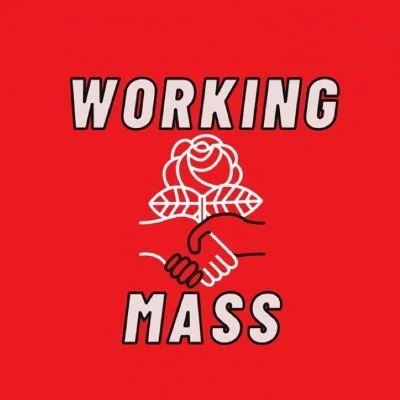
The Fall and Rise of Massachusetts Rent Control

By: Kelly Regan
BOSTON, MA – “Uprooting members of a community degrades the public sphere,” observed Ben Greer, a Boston DSA member in multi-family residential architecture who works on affordable housing projects, decades after the fall of rent control in Massachusetts.
Displacement steals people – and thus, the public.
Statewide rent control made Boston a more affordable city for low- and moderate-income earners throughout the 1970s. This returned the city to rent control after landlords began chipping away at wartime stabilization, as tenants led by an Allston-Brighton tenant named Anita Bromberg pressured City Hall in a tenant alliance that included middle-class renters, student tenants, low-income senior citizens, and allied organizers.
Tenants won rent control before staving off landlord greed for a few decades through the base-building that built collective organizational power: tenant organizing, eviction blocking, high-profile rallies, agitational publications, even an attempted citywide rent strike.
After the landlords finally pushed through tenant defenses to win the 1994 ballot referendum, raising 90% of their funds for the campaign from big corporations, rents in cities like Boston skyrocketed. The rent increases had nothing to do with popular will; Boston, Brookline, and Cambridge all voted against the initiative, only for the City of Cambridge to see rents double in just four years. Meanwhile, Cambridge voters routinely elected wide majorities to their city council in favor of rent control.
The landlords of the Small Property Owners’ Association (SPOA) led the ballot initiative even though units had been “decontrolled” since 1975. Landlords could snatch back rent-stabilized units to inflate the prices after they had been stabilized for tenants. Brookline had decontrolled most of its units before the 1994 law. Landlords kept eating away, one decontrol after another.
By the time of the ballot initiative, 60,000 units were decontrolled versus only 20,000 controlled.
The Role of Struggle
While much of the story of the fall of rent control ccurred in the Legislature, the fall of tenant organizations played a key role. One at the center of the fight to keep rent control was the Cambridge Tenants Organizing Committee (CTOC). When tenants fought against a plan to turn working class Cambridge into “the brain center of the military-industrial complex,” they built a committee of tenants and built an organization out of member dues. Ultimately, CTOC disbanded as both internal dysfunction and changing political climate led CTOC to disorganize.
Cultural hubs throughout Boston, Cambridge, Somerville, and other Massachusetts cities died out as artists and eccentrics were forced to relocate to more suburban and rural areas. The end of rent control also changed the bourgeois business landscape, with many small enterprises closing or relocating. This decimated the local economies of entire neighborhoods and closed them off, except for the students and the rich who could afford the upscale chains that survived in places like Harvard Square. The businesses that have been able to stay open have struggled to attract and retain workers due to the state’s high cost.
As housing costs in Massachusetts continue to rise, many renters find themselves severely cost-burdened. This increase is felt not just by low-income earners, but also by middle-income earners, who are increasingly cost-burdened by rent.
Since there are currently no restrictions on rent increases, some Massachusetts residents see increases of hundreds of dollars when renewing their leases. Residents who can’t afford the steep hike in rent must find a new home. Worcester has seen an exodus of residents who can no longer afford the city’s cost of living. Tenants from Boston are displaced to the suburbs are displaced to Worcester are displaced out; every single one leaves a void, a home lost.

Rent Control in 2026
Thirty two years after rent control was banned in Massachusetts, housing justice advocates want to bring it back. Last summer, Homes for All Mass filed an initiative petition with Attorney General Andrea Campbell’s office as the first step in a lengthy process to get the rent control ballot measure in front of Massachusetts voters.
Greer said:
All people deserve stability. Rent control allows Massachusetts tenants to be able to settle within their neighborhoods, raise families, and contribute to the community without having to fear displacement.
The 2026 ballot measure would limit rent increases to the cost of living increase with a 5% cap with exemptions for owner-occupied buildings with four or fewer units and new builds within the first ten years.
The next phase, which is collecting 74,574 certified signatures, began on September 5, 2025. For a signature to count, it has to be verified by the city clerk as coming from a registered voter. This is to ensure that signatures come from Massachusetts residents. Illegible signatures or signatures from residents outside of Massachusetts are not counted.
Boston DSA members voted to endorse Homes for All Massachusetts ballot question campaign to pass rent control in September 2025. The Homes For All coalition included organizations like City Life/Vida Urbana, Community Action Agency of Somerville, and the Chinese Progressive Association. Members in Boston DSA helped collect 1,298 of the 124,000 total signatures collected across multiple counties surrounding the Boston area.
Dominic Salvucci, a Boston DSA member living in Lawrence, Massachusetts, organized over 14 canvasses in his area. Salvucci noted that the campaign allowed him to have interesting conversations with his neighbors and bring in new organizers to Boston DSA.
According to Salvucci, the method “was also helpful in bringing in new membership and expanding the idea of class consciousness to inactive but sympathetic socialists in the region.”
Submitting at least 74,574 signatures means the Legislature has until June 2026 to vote on adopting the rent control legislation. If the Legislature votes against, 12,429 more certified signatures must be collected for rent control to be on the 2026 ballot.
While Governor Healy has spoken against rent control, other politicians have spoken in support. Boston Mayor Wu made rent control part of her platform. The executive has previously endorsed rent control and stated:
We know that other cities across the country who have implemented rent stabilization and rent control are seeing it working.
The Mayor is joined also by some legislators. Massachusetts State Representative and Boston DSA member Erika Uyterhoeven also supported the signature collection campaign for rent control. Uyterhoeven said:
Every time I’ve asked someone to collect signatures, it’s an enthusiastic yes to volunteering and joining the Homes for All coalition. I also believe this is vital work for DSA to deepen our coalition and build our power by building up our membership’s capacity for the fight ahead.
However, the bulwark of support — much like last time, in defense of rent control — has been found at the municipal level. Cities throughout Massachusetts have expressed support for rent control regulation. The Boston City Council passed a resolution in support of the rent control bill on January 30th. The cities of Easthampton and Northampton have passed similar resolutions in support of this rent control legislation. City councils signing on in support of rent control legislation doesn’t guarantee that the House or Senate will pass a rent control bill. It does show that rent control is popular among residents of those cities, which could sway some legislators.

The Landlords’ Legislature
It is unlikely that the Legislature will act on the rent control bill, even if some legislators may be exceptions in supporting rent control. The Boston Globe found that more than one in four Massachusetts legislators own multiple homes or properties. This is unsurprising in a country where the vast majority of legislators are not tenants in any state. The Globe also reported that, in 2023, at least 36 legislators own commercial, residential, or short-term rental properties. With so many landlords in the Massachusetts legislature, it’s no surprise that the fight for rent control has been an uphill battle.
And some of the same opponents remain as stalwart interest groups influencing legislative decision-making. The president of the same Small Property Owners’ Association (SPOA) that led the successful campaign to vanquish Massachusetts rent control last time has threatened his own personal capital strike. As the landlord leader lamented to the Wall Street Journal:
He later took ownership of that property, but said he sold it last year for fear rent control would return. He said he still owns five units in Beverly and Rockport, two communities northeast of Boston, but that he would consider leaving the business and even the state if the ballot measure passes.
Some Massachusetts residents are initially wary of rent control precisely because much of the conversation around rent control has been dominated by landlords.
While collecting signatures, Salvucci talked with one Massachusetts resident about how capitalist policies have led to a sharp increase in living expenses while stagnating wages. Decades have made the crisis starkly clear. The resident signed the petition for rent control and told Salvucci:
[Rent control] makes more sense when you look at it from the shoes of people who are just trying to make their way now.
When rent control was first won, tenants built the power needed block by block – apartment by apartment, spadework by spadework. The story of the Cambridge Tenants Organizing Committee (CTOC) also promises a road forward. As tenants organize across the region at new complexes in the greatest wave of tenant organizing since the 1970s that won rent control originally, the fight for rent stabilization follows.
The question is who will win this phase of the struggle: landlords, or tenants?
Kelly Regan is the co-chair of Boston DSA’s Housing Working Group.
The post The Fall and Rise of Massachusetts Rent Control appeared first on Working Mass.


CA DSA Endorses Oliver Ma for Lieutenant Governor of California
California DSA delegates, representing chapters from across the state, have voted to endorse Oliver Ma for Lieutenant Governor. Oliver will be CA DSA’s first-ever endorsed statewide candidate and is running on an explicitly democratic socialist platform that articulates a vision of a California that works for working people—not oligarchs and billionaires.
Oliver immigrated to California at age seven and has dedicated his career as a lawyer to protecting the rights of tenants, immigrants, and workers. As an immigrant rights attorney with the ACLU, Oliver has been on the front lines of defending Californians against ICE and the federal government’s terror campaign. When elected, he will shut down the for-profit detention centers that have proliferated across our state, ending the profits made from our exploitation.
One of the primary areas of influence of the Lieutenant Governor is over California’s higher education system. Currently, University of California schools alone have over $32 billion invested in assets tied to genocide and apartheid in Palestine. Not only is Oliver the only candidate to describe the atrocities in Gaza as genocide, he is the only candidate who has promised to divest these funds from Israel and ensure that our higher education institutions are not funding atrocities overseas.
Oliver is committed to building something that lasts beyond his campaign and, in this, building DSA statewide. Oliver understands, like all democratic socialists must, that an organized movement of working people is more than one candidate or one campaign. If you are not in DSA yet, join today and get involved with our statewide organization or in your local chapter’s work.
For more information on Oliver Ma, go to: https://oliverma2026.com/


Taxing the rich: CA DSA Endorses the 2026 Billionaire Tax Act and the Children’s Education and Health Care Protection Act of 2026
California DSA delegates, representing chapters from across the state, have recently voted to endorse the Billionaire Tax Act and the Children's Education and Health Care Protection Act, under a unified campaign to ‘Tax the Rich’.
The Billionaire Tax Act would levy a one-time 5% tax on individuals worth more than $1 billion in order to offset the loss of almost $100 billion of federal funding towards Californian healthcare. Without this funding, thousands of jobs will be lost, millions of Californians could lose coverage altogether, and care facilities across the state could be forced to close.
The Children’s Education and Health Care Protection Act would ensure the continuation of the temporary income tax imposed on the top 2% of income earners by CA’s Proposition 55 in 2016. This tax raises between $5 billion and $12 billion each year for children’s education and health care—the loss of that funding would be catastrophic.
The success of both measures would provide much-needed funding to California’s essential services. Thus, California DSA delegates voted to endorse both under a unified campaign to ‘Tax the Rich’.
The gap between the billionaires and the rest of us has never been wider. It is time for the wealth taken from workers to be invested back into our state, to fund our hospitals, schools, and essential services. It’s time to tax the rich.
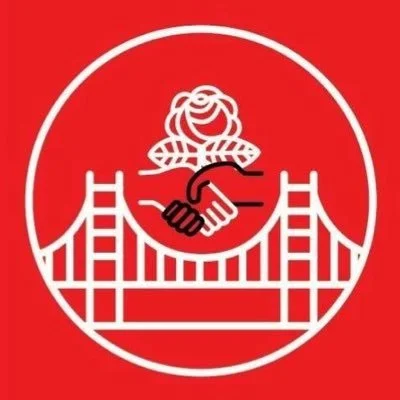

Weekly Roundup: February 17, 2026
Events & Actions
 Tuesday, February 17 (5:30 PM – 7:00 PM):
Tuesday, February 17 (5:30 PM – 7:00 PM):  Social Housing Meeting (zoom and in person at 1916 McAllister St)
Social Housing Meeting (zoom and in person at 1916 McAllister St)
 Tuesday, February 17 (7:00 PM – 8:00 PM):
Tuesday, February 17 (7:00 PM – 8:00 PM):  Public Transit Meeting (zoom and in person at 1916 McAllister St)
Public Transit Meeting (zoom and in person at 1916 McAllister St)
 Wednesday, February 18 (6:00 PM – 7:30 PM):
Wednesday, February 18 (6:00 PM – 7:30 PM):  What Is DSA? (1916 McAllister St)
What Is DSA? (1916 McAllister St)
 Thursday, February 18 (6:00 PM – 7:00 PM):
Thursday, February 18 (6:00 PM – 7:00 PM):  Social Committee Meeting (zoom)
Social Committee Meeting (zoom)
 Thursday, February 18 (7:00 PM – 11:00 PM):
Thursday, February 18 (7:00 PM – 11:00 PM):  UESF x DSA SF Strike Victory Social (Molotov’s, 582 Haight St)
UESF x DSA SF Strike Victory Social (Molotov’s, 582 Haight St)
 Thursday, February 19 (3:00 PM – 5:00 PM): Rally w/ California Nurses Association: Keep ICE Out of Hospitals (UCSF Parnassus Campus, 505 Parnassus Ave)
Thursday, February 19 (3:00 PM – 5:00 PM): Rally w/ California Nurses Association: Keep ICE Out of Hospitals (UCSF Parnassus Campus, 505 Parnassus Ave)
 Thursday, February 19 (6:30 PM – 7:30 PM):
Thursday, February 19 (6:30 PM – 7:30 PM):  Public Bank Project Meeting (zoom)
Public Bank Project Meeting (zoom)
 Thursday, February 19 (7:00 PM – 8:00 PM): Immigrant Justice Working Group Meeting (zoom and in person at 1916 McAllister St)
Thursday, February 19 (7:00 PM – 8:00 PM): Immigrant Justice Working Group Meeting (zoom and in person at 1916 McAllister St)
 Friday, February 20 (9:30 AM – 10:30 AM):
Friday, February 20 (9:30 AM – 10:30 AM):  District 1 Coffee with Comrades (Breck’s, 2 Clement St)
District 1 Coffee with Comrades (Breck’s, 2 Clement St)
 Saturday, February 21 (11:00 AM – 2:00 PM):
Saturday, February 21 (11:00 AM – 2:00 PM):  ETOC Session 3 – Building Campaigns II (1916 McAllister St)
ETOC Session 3 – Building Campaigns II (1916 McAllister St)
 Saturday, February 21 (11:00 AM – 1:00 PM):
Saturday, February 21 (11:00 AM – 1:00 PM):  Public Bank Lit Drop – Alamo Square (Hayes Street & Scott Street)
Public Bank Lit Drop – Alamo Square (Hayes Street & Scott Street)
 Saturday, February 21 (6:00 PM – 8:00 PM):
Saturday, February 21 (6:00 PM – 8:00 PM):  HWG Food Service (Castro Street & Market Street)
HWG Food Service (Castro Street & Market Street)
 Sunday, February 22 (1:30 PM – 3:00 PM):
Sunday, February 22 (1:30 PM – 3:00 PM):  Get to Know EWOC!
Get to Know EWOC!  (1916 McAllister St)
(1916 McAllister St)
 Sunday, February 22 (5:00 PM – 6:00 PM):
Sunday, February 22 (5:00 PM – 6:00 PM):  Tenderloin Healing Circle Working Group (zoom)
Tenderloin Healing Circle Working Group (zoom)
 Monday, February 23 (6:00 PM – 8:00 PM):
Monday, February 23 (6:00 PM – 8:00 PM):  Tenderloin Healing Circle (Kelly Cullen Community, 220 Golden Gate Ave)
Tenderloin Healing Circle (Kelly Cullen Community, 220 Golden Gate Ave)
 Monday, February 23 (6:30 PM – 7:30 PM):
Monday, February 23 (6:30 PM – 7:30 PM):  DSA Run Club (McClaren Lodge, Golden Gate Park)
DSA Run Club (McClaren Lodge, Golden Gate Park)
 Monday, February 23 (7:00 PM – 8:00 PM): Labor Board Meeting – UESF Strike Support Retrospective (zoom and in person at 1916 McAllister St)
Monday, February 23 (7:00 PM – 8:00 PM): Labor Board Meeting – UESF Strike Support Retrospective (zoom and in person at 1916 McAllister St)
 Tuesday, February 24 (6:30 PM – 7:30 PM): Ecosocialist Bi-Weekly Meeting (zoom and in person at 1916 McAllister St)
Tuesday, February 24 (6:30 PM – 7:30 PM): Ecosocialist Bi-Weekly Meeting (zoom and in person at 1916 McAllister St)
 Wednesday, February 25 (6:45 PM – 8:30 PM): Tenant Organizing Working Group Meeting (zoom and in person at 438 Haight St)
Wednesday, February 25 (6:45 PM – 8:30 PM): Tenant Organizing Working Group Meeting (zoom and in person at 438 Haight St)
 Thursday, February 26 (6:00 PM – 7:00 PM):
Thursday, February 26 (6:00 PM – 7:00 PM):  Education Board Open Meeting (zoom)
Education Board Open Meeting (zoom)
 Thursday, February 26 (7:00 PM – 8:30 PM):
Thursday, February 26 (7:00 PM – 8:30 PM):  ICE Out Orientation (zoom and in person at 1916 McAllister St)
ICE Out Orientation (zoom and in person at 1916 McAllister St)
 Saturday, February 28 (11:00 AM – 2:00 PM):
Saturday, February 28 (11:00 AM – 2:00 PM):  ETOC Session 4 – From Organizing Committee to Mass Organization (1916 McAllister St)
ETOC Session 4 – From Organizing Committee to Mass Organization (1916 McAllister St)
 Saturday, February 28 (11:00 AM – 1:00 PM):
Saturday, February 28 (11:00 AM – 1:00 PM):  Physical Education + Self Defense Training (Kelly Cullen Community, 220 Golden Gate Ave)
Physical Education + Self Defense Training (Kelly Cullen Community, 220 Golden Gate Ave)
 Saturday, February 28 (1:00 PM – 4:00 PM):
Saturday, February 28 (1:00 PM – 4:00 PM):  DSA SF at Alemany Farm (Alemany Farm, 700 Alemany Blvd)
DSA SF at Alemany Farm (Alemany Farm, 700 Alemany Blvd)
 Sunday, March 1 (2:00 PM – 3:30 PM):
Sunday, March 1 (2:00 PM – 3:30 PM):  What Is DSA? (Ortega Branch Library, 3223 Ortega St)
What Is DSA? (Ortega Branch Library, 3223 Ortega St)
 Sunday, March 1 (11:00 AM – 1:00 PM):
Sunday, March 1 (11:00 AM – 1:00 PM):  Sip ‘n’ Stitch (TBD)
Sip ‘n’ Stitch (TBD)
 Monday, March 2 (6:30 PM – 8:00 PM): Homelessness Working Group Regular Meeting (zoom and in person at 1916 McAllister St)
Monday, March 2 (6:30 PM – 8:00 PM): Homelessness Working Group Regular Meeting (zoom and in person at 1916 McAllister St)
 Monday, March 2 (7:00 PM – 8:00 PM): Labor Board – Flex Meeting (zoom)
Monday, March 2 (7:00 PM – 8:00 PM): Labor Board – Flex Meeting (zoom)
Check out https://dsasf.org/events for more events and updates.
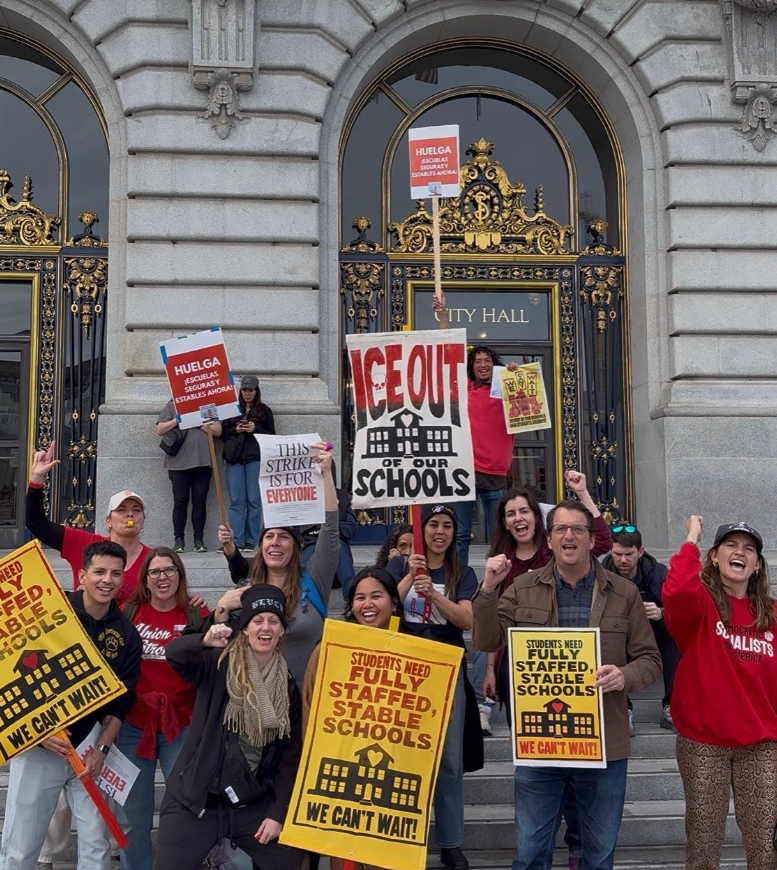
When We Fight, We Win!
Last Friday, after 4 days of striking by UESF educators, UESF finally reached a tentative agreement! WE WON!!
When we got word about the strike, DSA SF jumped into action, raising over $19,000 to fund strike support and hundreds of DSA members marched, showed up at picket lines, cooked for students while schools were closed, and brought supplies and meals to fuel strikers in their fight for better working conditions and for public education.
With the money raised, DSA SF served more than 2,000 meals to students and to strikers on the picket line. Socialists in San Francisco stand with organized workers and are prepared to materially support workers in their fight for fair wages and working conditions!
Join us at the following events to celebrate our contributions to this historic victory with our union comrades and to discuss follow up steps with the labor board!!
- Wednesday, February 18th at 7 PM – Joint Social with UESF @ Molotov’s RSVP here
- Monday, February 26th at 6-8 PM – Bread For Ed Retrospective at our regular Labor Board Meeting
Power to the educators! Power to the workers!
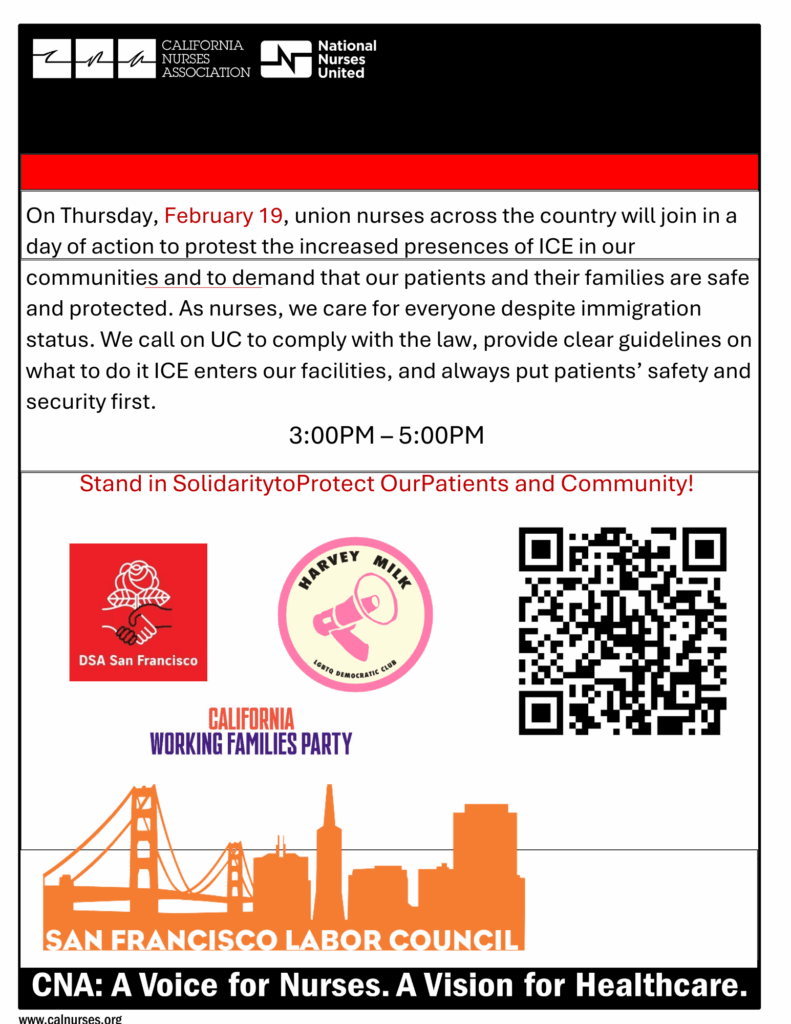
UCSF Parnassus Day of Action
On Thursday, February 19, union nurses across the country will join in a day of action to protest the increased presence of ICE in our communities and to demand that our patients and their families are safe and protected. As nurses, we care for everyone despite immigration status.
We call on UC to comply with the law, provide clear guidelines on what to do if ICE enters our facilities, and always put patients’ safety and security first.
Stand in solidarity to protect our patients and community! Join us at UC Parnassus (505 Parnassus) on Thursday, February 19 at 3 PM. RSVP here
Our member Luis will be speaking, so show up and wear your DSA swag!
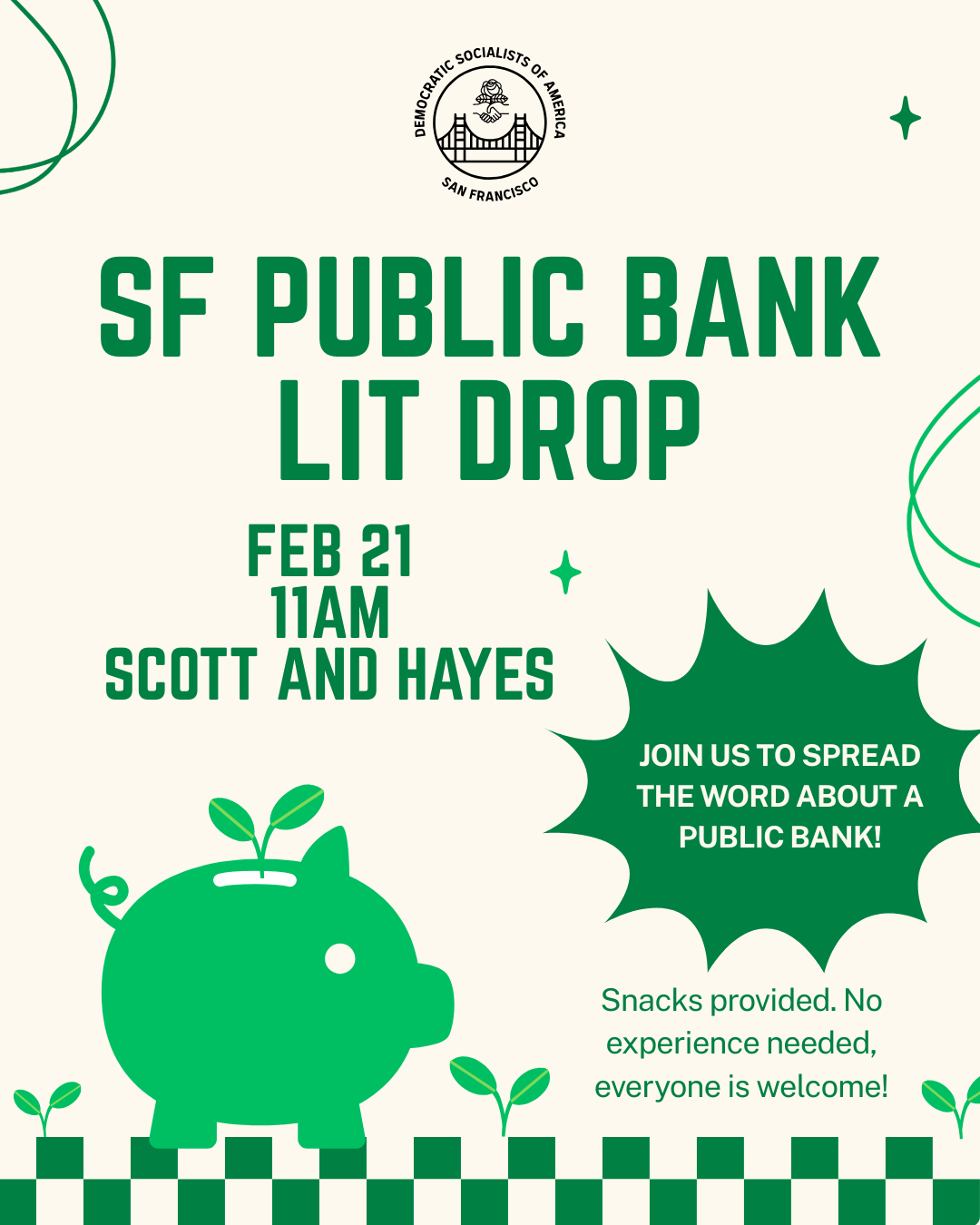
SF Public Bank Lit Drop
Please join the Ecosocialist Working Group and the SF Public Bank Coalition for a lit drop event this upcoming Saturday, February 21st. We’ll be meeting at Alamo Square Park (Scott and Hayes). No experience needed and snacks will be provided. We’re planning on meeting up afterwards for food and drink. RSVP here
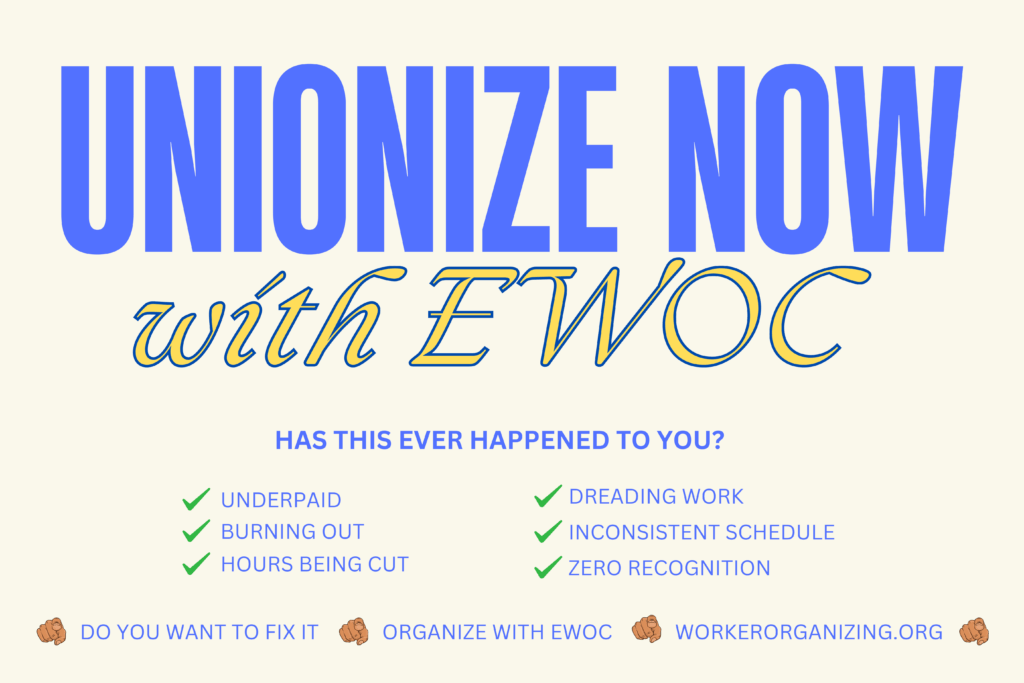
 Get to Know EWOC!
Get to Know EWOC! 
Overworked, underpaid, and fed up with your working conditions? Interested in learning what it means to unionize your workplace? Come talk to organizers and volunteers from the San Francisco local of the Emergency Workplace Organizing Committee (EWOK)!
We’ll be at 1916 McAllister from 1:30 to 3PM on Sunday, February 22nd. RSVP here
The Emergency Workplace Organizing Committee (EWOC) is a volunteer-run network of hundreds of workers, organizers, and supporters who together are building a stronger, worker-led labor movement. We support and train any non-union worker in any industry who wants power and agency at work. Along with unions and other labor organizations, we can build the militancy and strength of the working class and effectively organize the millions of unorganized workers in the United States.
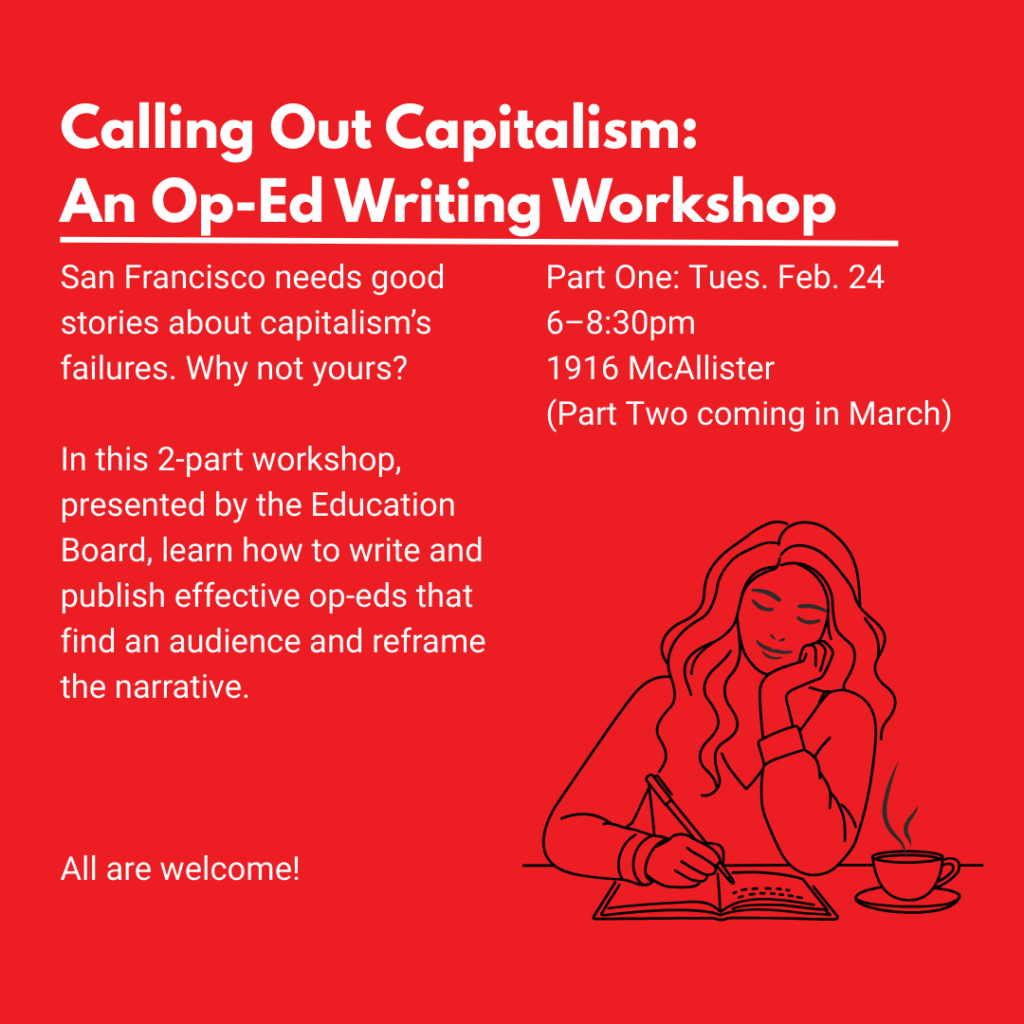
Calling Out Capitalism: An Op-Ed Writing Workshop
Back by popular demand, Ed Board has set dates for the next round of Op-Ed Writing Workshops! Part One is coming up on Tuesday, February 24 at 6PM. Held in-person at 1916 McAllister. RSVP here
We’ll cover techniques and strategies for writing effective op-eds, and lead some writing activities to get you crafting op-eds of your own. Part Two, a workshop to give/get peer feedback on your op-ed drafts, is up in March. Stay tuned for details!
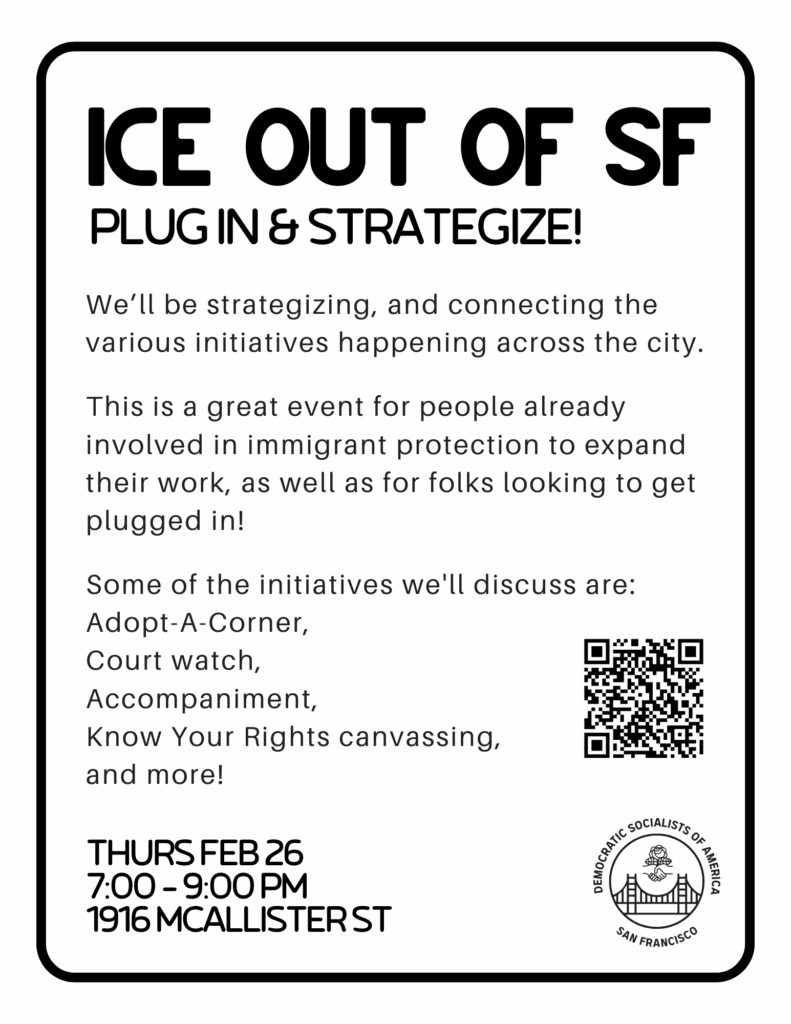
ICE Out of SF: Plug in and Strategize!
We’ll be strategizing, and connecting the various initiatives happening across the city.
This is a great event for people already involved in immigrant protection to expand their work, as well as for folks looking to get plugged in.
Some of the initiative we’ll discuss are: Adopt-A-Corner, Court watch, Accompaniment, Know Your Rights canvassing, and more!
Join us at 1916 McAllister St on Thursday, February 26 at 7 PM. RSVP here
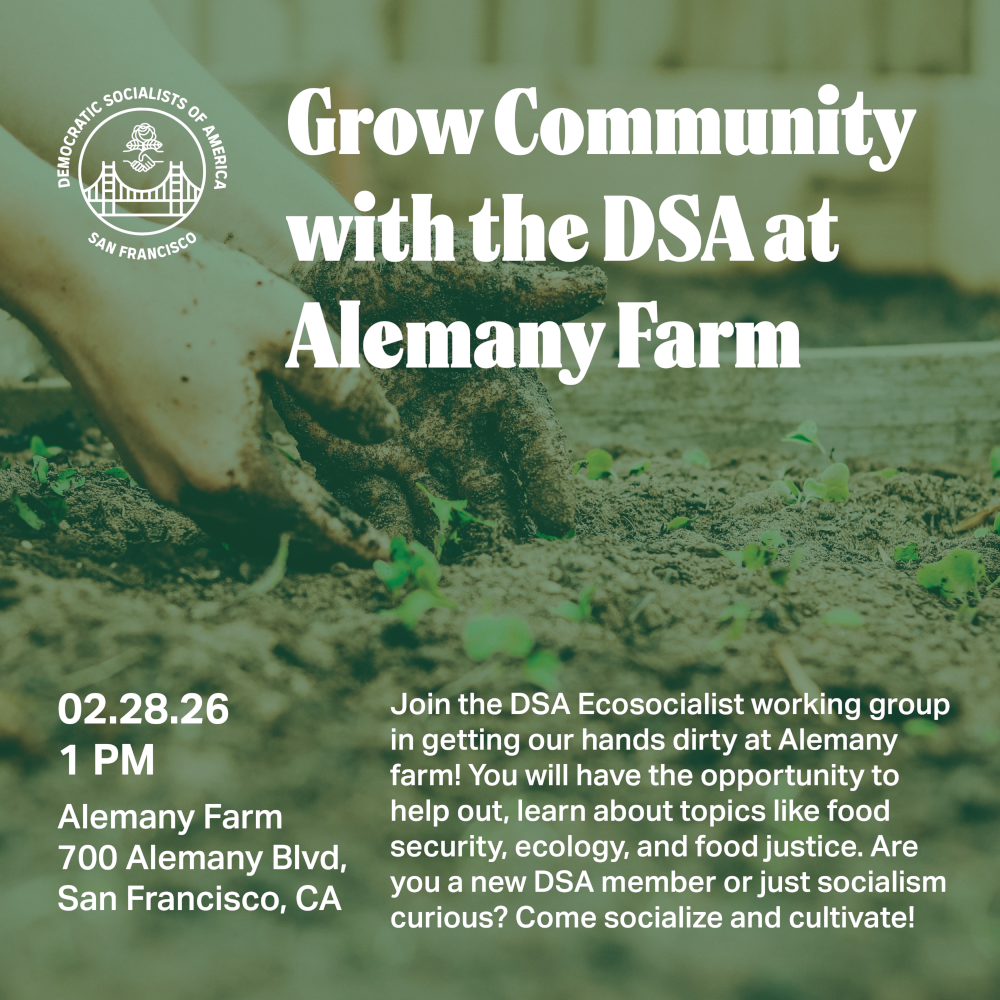
Grow Community with the DSA at Alemany Farm
Come join DSA SF’s Ecosocialist working group on Saturday, February 28th at 1:00 PM at one of San Francisco’s community gems, Alemany Farm.
This is a great event for both new members and long-time DSA members. Come expand your ecological consciousness and spend an afternoon with knowledgeable urban agriculturalists and fellow comrades. Email ecosocialist@dsasf.org with any questions. RSVP Here

Emergency Tenant Organizing Committee (ETOC) Fundamentals of Tenant Organizing Watch Party
Looking to deepen your understanding of housing work on the ground? Interested in building durable tenant power in SF? Come learn how to organize tenant associations, fight landlords collectively, and build toward radical tenant unionism in San Francisco. These ETOC watch parties happen every Saturday in February at 11:00 AM at our office (1916 McAllister) and focus on turning socialist analysis into mass tenant struggle: investigation, campaigns, and building real tenant organizations that can win. If you’re serious about anti-landlord work, this is where to plug in.
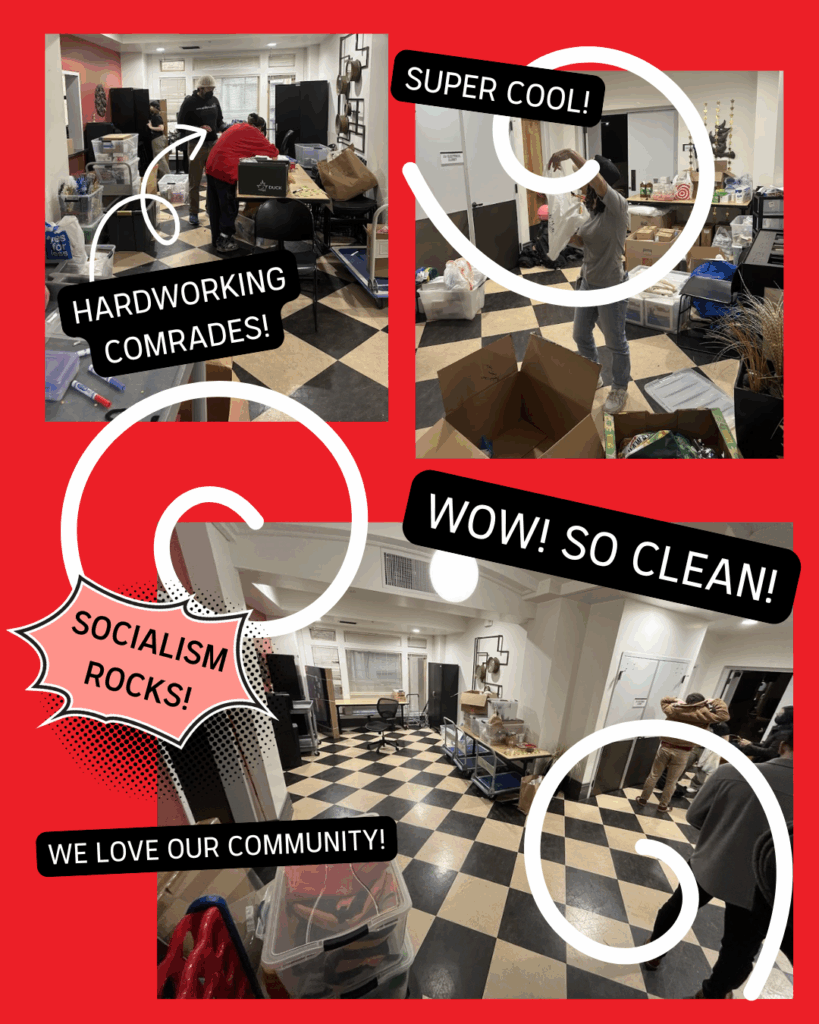
Thank You Kelly Cullen Community Cleaning Comrades!
On Friday the 13th (spooky~), Tenderloin Healing Circle hosted a café cleaning event at Kelly Cullen Community!! This mutual aid action allowed us to show our gratitude to KCC for allowing us to use the auditorium for chapter meetings, TLHC, and Phys Ed; as well as help provide a clean and cozy space for residents to hang out.
A mighty crew of 9 spent 2 hours sorting, bagging and boxing all the supplies so the building manager can start setting up supply stations and get a sense for what inventory they have available. The Tenderloin Healing Circle will also be hosting a follow-up event to help the building manager set up a linen closet with the supplies we helped organize, so keep an eye out for that!
Thank you again to everyone who showed up and helped!
Behind the Scenes
The Chapter Coordination Committee (CCC) regularly rotates duties among chapter members. This allows us to train new members in key duties that help keep the chapter running like organizing chapter meetings, keeping records updated, office cleanup, updating the DSA SF website and publishing the weekly newsletter. Members can view current CCC rotations.
Interested in helping with the newsletter or other day-to-day tasks that keep the chapter running? Fill out the CCC help form.

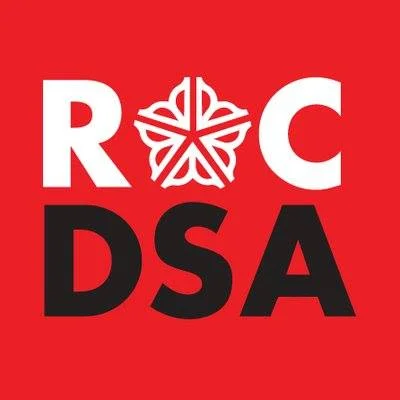
Citizen Spectators
by Jean Allen
Today, in the early hours of January 3rd, 2026, Donald Trump ordered the bombing of Caracas and the kidnapping of Venezuelan president Maduro as well as the first lady. This international smash and grab succeeded where twenty years of sanctions and international law couldn’t. As of the 3rd, the Bolivarian republic seems decapitated, and President Trump is openly speaking of taking Venezuelan oil.
The first political action I ever took was when my dad brought me to the 2003 protest against the Iraq War in New York City. It was the first time I’ve felt something I have felt so many times since–that I was within history, that I was doing something important with hundreds of thousands of other people. The 2003 protests were organized by the ANSWER coalition, a mix of socialist sects and newly mobilized liberals. ANSWER hoped to replicate the Vietnam-era protests against the war, and in terms of pure numbers they beat them. More Americans marched in 3/2003 than they ever had for any cause before.
In a way, those protests had an effect on the US state, just not the one wished for by the protestors. By 2003, the government had spent 30 years insulating foreign policy from popular discontent, by removing the draft and having our incursions short and based on air warfare. The opposition to Bush’s wars accelerated this process, as our military became focused on a small group of special forces ‘operators’ and mercenaries drawn from a smaller and smaller portion of the United States.
At this point, the President and his appointees are the only people who truly get to decide anything about our foreign policy. The president comes to power via indirect and relatively low-participation elections. In both elections Trump won, “Did Not Vote” would have beaten him and his opponent. This is in keeping with the vision our founders had of an executive with the power to interact with foreign kings, insulated from the will of the popular classes.
Because of this insulation, the relation most American citizens have to US foreign policy is that of spectators. We watch the TV show, we have opinions on it, we argue with each other about those opinions. Maybe we attend a rally, maybe we sign a statement, maybe we get our union to sign a statement, maybe we do a direct action which will affect .1% of the military materiel produced. Zooming out, for most people politics means arguing with family members about the TV show. But none of those things matter, none of those touch power. And so we spend most of our time arguing with each other about the TV show we’re all watching, because that feels like power. The Anti-Iraq War coalition fell apart under that tension, and the life of any activist is full of examples of infighting because of this.
I want to be clear that I view every single person who’s organized against the military as a hero. And I do not say this to demoralize. But we need to start planning at the scale we need to, and acknowledging the insufficiency of the tools we have against our undemocratic and colonial government is the first step to that. Our unions are an order of magnitude smaller and less militant than we need. Our rallies next to empty federal buildings are ignored. Our direct actions are affecting a small portion of the military industrial complex. Our international organization is effectively nonexistent. Socialists can only meaningfully elect federal-level politicians in a handful of places, and too often, anti-imperialism has been seen as a luxury belief unrelated to the socialist aim of affordability. Malcolm Harris said the day before Trump’s attack, “What’s the point of wanting to take power if you can’t?” That perspective, that we are arguing for nothing, has been a healthy counter to the crab-in-a-bucket instinct to infight since we can’t do much. Even the gesture at innovating new tactics feels like sand in my mouth. But it accepts that we will always be infantilized, always be spectators, in a way that feels disgusting now.
We have the tactics, we know the goal: organize the working class and the oppressed together to win a society where we can rule. But we do not have a plan at the scale we need to prevent the world from being brought down alongside the death throes of our declining empire. While we often talk about raising consciousness or educating the masses, popular opinion is on our side, both regarding socialism and against Trump’s suicidal adventurism. These opinions do not get to be expressed in our political system, so what DSA must focus on, in 2026 and 2028 and going forward, is voting in a bloc of congressional legislators who will be a consistent voice against militarization. We must do this because the attacks on Venezuela are accelerating a worldwide move towards increased militarization powered by world-destroying arms; and every dollar spent on guns, tanks, and aircraft is money not spent on the hospitals, schools, and environmental protections we’ll need in our hotter and hotter world. We have few chances to stop this, and we must prepare on a larger scale for the first opportunity.
The post Citizen Spectators first appeared on Rochester Red Star.
